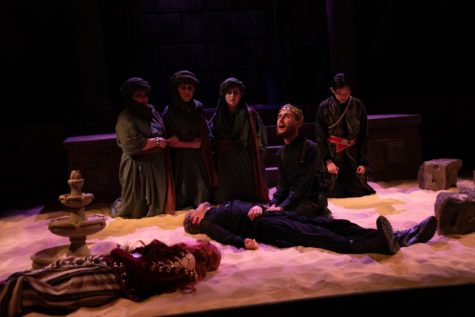‘Antigone’: Tulane’s other Greek life this semester
March 23, 2022
This past week, Tulane’s Theatre and Dance department put on “Antigone,” a work by the Greek playwright Sophocles’, translated by Ann Carson and directed by Ryder Thornton. The translation, intended to make the third Theban play easier to understand and more modernized, was a delight to see performed.
The classic Greek tragedy is the third and final play in Sophocles’ Oedipus Rex trilogy. Antigone, the daughter — and sister — of Oedipus, seeks to bury her brother Polyneices, who has been denied the Greek burial right by the order of their uncle and king, Kreon. The play tackles issues of justice and law, and the moral implication of what really makes an act right or wrong.
Walking into the Albert Lupin Memorial Theater was a transformative experience. It was as if you were entering the ruins of a castle. The large sand pit overtook the landscape — in the best possible way — making you forget that you are not in the city of Thebes, but actually in New Orleans. This set beautifully depicted that Thebes was on its way to ruin after the tragedy of Oedipus and the battle between his sons. The chorus — written as elders of Thebes there to advise Kreon in his new role as king — as well as the live music strongly set the eerie mood and aided in the transformative experience, keeping the audience at the edge of their seats.

The costumes added a modern take to Greek tragedy costume design and nuance to the characters, as well as how each role was played. The modern silhouette for the costume of Antigone, played by Lourdes Castillo, aided her as she gracefully portrayed strength and resilience onstage, stealing the audience’s hearts with the fire in her eyes and the love for her fallen brother. Kreon’s, played by Jared Goudsmit, modern jacket and trousers initially raised eyebrows but looked quite similar to the fashions of early 20th century dictators, and the king upheld a dictatorship as well. Both his power and pain provided discomfort to the audience in the best and worst way. What really caught my eye was the studded fanny pack worn by the messenger, Helena Wang. While it slightly added to the whimsical nature of her stage presence, it was a confusing choice.
The cast started rehearsals in January after auditioning and finding out about their parts in December before winter break. They expressed that it took a lot to bring the Theban play to life, despite the shorter length of the play.
In the words of Mike Maloney, who played the Guard that seamlessly managed to add comedic relief to this dark tragedy, “Though the long rehearsals could prove challenging at times, Antigone was a really fulfilling experience.”
Grace Boseley, who played the ethereal Eurydice described the best part of this production as, “the collaboration of all of us together to form, at the end, a piece that we truly enjoyed working with. I think the camaraderie was definitely what kept me going.”
The production of “Antigone” was definitely intriguing to watch, leaving the audience with the feeling of sorrow for the tragedies that happened but also the contemplation of what right and wrong can truly mean.





















Leave a Comment